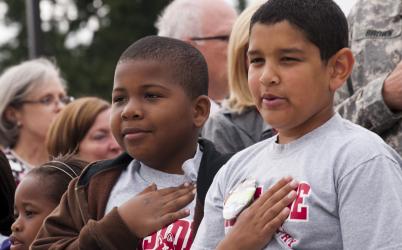Yesterday too many people across the Internet were “losing their mind” over students at a Pine Bush, New York, school saying the Pledge of Allegiance in Arabic as part of a diversity celebration. See one article here. And Facebook responses here. For my thoughts about the Pledge specifically, see the last part of this blog.
My comment was: Celebrations should occur for this school’s bravery and embracement of diversity. The Pledge of Allegiance can belong to anyone and can be said in any language. The ideas are the same regardless of the specific signs and sounds used to communicate them, as a study of semiotics shows.
My comment got a surprising number of supporters but clearly most people on the page had other priorities in their world view. Some of the comments particularly struck me.
For example:
Sorry Andrew, but I do not agree with you. Just because we are a diversified country, does not mean we should give up what America is. The Pledge of Allegience [sic] belongs to America. Do you really think that things like this would occur in other countries? You come here for freedom, that means you want to be part of America and that includes the English Language which is and should be the official language of America. Come here yes, come here legally yes, but don’t expect us to learn “your” language, you need to learn ours.
I am not sure if this was a generic “you” or pointed specifically at me. People do increasingly think “Pegoda” means I am an immigrant or from some place “weird.” Regardless, native citizens don’t recognize often enough that they were born here by an accident of time and place, geography, and biology. Immigrants who come here, generally come here because it is geographically close, not simply because of the so-called promise of freedom. People in the U.S. follow this idealized immigrant rhetoric (that people come to the U.S. because it is so great) far more than people out of the US or actual immigrants. Such immigrant rhetoric serves to boost ethnocentrism, not to welcome diversity, when we get right down to it.
People who are so proud of their freedom and have such intense feelings about the United States–nothing more than a geopolitical area–need to step back a little. Why not share your freedom with others? And in this case, despite prevailing social Darwinistic ideologies, sharing would not result in decreased freedom for anyone, at least it need not.
Also, the United States has no official language. A language is nothing more than a semi-unique, temporary cluster of history, signs, sounds, and other elements all adding up to be a cultural. I read one article that said in 500 years all languages spoken today will be completely unrecognizable. Nothing is forever.
People fear the unknown, the new, the different. That’s natural. These fears can be overcome.
As the history of “old immigrants” vs “new immigrants” in the GAPE (Gilded Age and Progressive Era) shows, people are very conflicted when it comes to immigration. Debates over immigration are not new. People perpetually, though, refuse to fully recognize the influence of immigrants and the ever-presentness of languages other than English in the United States. Mexican-Americans, for instance, have been here longer than any other person of at least some recent European origins. We could all be speaking a version of Spanish right now.
I’m also annoyed (personal peeve! sorry!) when people call the United States, “America.” “America” most accurately refers to over sixteen million square miles in North and South America and “Americans” to the approximately one billion peoples who call these lands home. By not using “American” we consciously remember all of the other peoples and nations who surround us. Give the United States’s long, unwelcome assertion of imperialism around the world generally and in this hemisphere specifically, this small change in diction is a start that empowers everyone to have a broader and more complete perspective.
All of these issues, and more, make holidays such as the 4th of July (see here and see here) and Memorial Day (see here– this was one of my very first blog posts), very complicated holidays for an ever growing number of people.
Thanks for reading. 🙂
